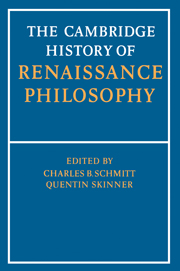Book contents
- Frontmatter
- Introduction
- PART 1 THE INTELLECTUAL CONTEXT
- PART 2 PHILOSOPHY AND ITS PARTS
- 6 Logic and language: Traditional logic
- 7 Logic and language: Humanistic logic
- 8 Natural philosophy: Traditional natural philosophy
- 9 Natural philosophy: The new Philosophy of nature
- 10 Natural philosophy: Astrology and magic
- 11 Moral philosophy
- 12 Political philosophy
- 13 Psychology: The concept of psychology
- 14 Psychology: The organic soul
- 15 Psychology: The intellective soul
- 16 Metaphysics
- 17 Problems of knowledge and action: Fate, fortune, providence and human freedom
- 18 Problems of knowledge and action: Theories of knowledge
- 19 Problems of knowledge and action: Epistemology of the sciences
- 20 Philosophy and humanistic disciplines: Rhetoric and poetics
- 21 Philosophy and humanistic disciplines: The theory of history
- PART 3 SUPPLEMENTARY MATERIAL
- Biobibliographies
- Bibliography
- Index nominun
- Index rerum
- References
13 - Psychology: The concept of psychology
from PART 2 - PHILOSOPHY AND ITS PARTS
Published online by Cambridge University Press: 28 March 2008
- Frontmatter
- Introduction
- PART 1 THE INTELLECTUAL CONTEXT
- PART 2 PHILOSOPHY AND ITS PARTS
- 6 Logic and language: Traditional logic
- 7 Logic and language: Humanistic logic
- 8 Natural philosophy: Traditional natural philosophy
- 9 Natural philosophy: The new Philosophy of nature
- 10 Natural philosophy: Astrology and magic
- 11 Moral philosophy
- 12 Political philosophy
- 13 Psychology: The concept of psychology
- 14 Psychology: The organic soul
- 15 Psychology: The intellective soul
- 16 Metaphysics
- 17 Problems of knowledge and action: Fate, fortune, providence and human freedom
- 18 Problems of knowledge and action: Theories of knowledge
- 19 Problems of knowledge and action: Epistemology of the sciences
- 20 Philosophy and humanistic disciplines: Rhetoric and poetics
- 21 Philosophy and humanistic disciplines: The theory of history
- PART 3 SUPPLEMENTARY MATERIAL
- Biobibliographies
- Bibliography
- Index nominun
- Index rerum
- References
Summary
Philosophers and scientists of the Renaissance did not treat psychology, the philosophical study of the soul, as an independent discipline. Following the medieval tradition, they placed it within the broader context of natural philosophy, and they approached it, like the other sub-divisions of natural philosophy, through the works of Aristotle, notably De anima and the Parva naturalia. The term psychologia itself was coined–apparently by the German humanist Joannes Thomas Freigius in 1575 – to refer to the traditional complex of problems originating from these two works. Thus it is in relation to the Aristotelian tradition, and more specifically to the Aristotelian philosophy of nature, that the meaning and content of psychology in this period must be defined.
Aristotle and his followers defined the soul as the life principle of the individual body – that which differentiated living from non-living things. As such it was the source and formal cause of the specific functions and activities of animate beings, including plants and animals as well as men. Thus before the seventeenth century, when Descartes, Stahl and others moved to divorce the notions of life and soul, there was no clear division between psychology and what we now call biology. Although Renaissance writers emphasised problems of cognition, emotion and volition (the main subjects of De anima), the field also included a good deal of plant and animal physiology, based not only on the Parva naturalia but also on the ‘animal books' of Aristotle and to a lesser extent on the pseudo-Aristotelian De plantis.
- Type
- Chapter
- Information
- The Cambridge History of Renaissance Philosophy , pp. 453 - 463Publisher: Cambridge University PressPrint publication year: 1988
References
- 2
- Cited by



